

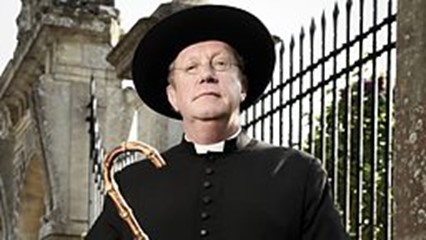 BBC1: Mon-Fri at 14:15 Series 3
BBC1: Mon-Fri at 14:15 Series 3
Starring Mark Williams as Father Brown
Based on the Father Brown books by G K Chesterton
It is January. And the BBC, as it has done for the last two years, is showing Father Brown again. But why early afternoon? Fortunately there is iPlayer and I am sure most followers of the series watch it through iPlayer.
This series is an absolute joy to watch. Most of the episodes I can download on iPlayer to play back to my elderly mother.
OK so there are some historical inaccuracies. The major one is that the Roman Catholic Church is not the mainstream, established Church in England. The original Fr Brown was set after the First World War, this has been fast forwarded to the 1950's, after the Second World War. But what if lived in a world where the reformation did not take such a hold on England, that ancient parish churches were run by Roman Catholic priests. And then it falls into place.
These are classic Who Done It stories and main detective is a priest who rides a bicycle, aided and abetted by Mrs McCarthy (parish secretary) and Lady Felicia, together with Sid, Lady Felicia's chauffer. The stories are now departing from Chesterton's corpus of work, but some of the basic elements remain the same. Fr Brown is interested in the whole person, body and soul. The stories are set in a time when the death penalty was still in use, so to be convicted of murder could mean execution. Mark William's Fr Brown is a compassionate man, known to eat with sinners, he prays for the souls of the deceased, listens to the confessions of those in need and enjoys cricket and a bottle of good wine.
More information: http://www.bbc.co.uk/programmes/b03pmw4m
(The great thing about the BBC is no adverts. Just pure entertainment)



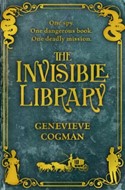 There are several categories of books, serious books that you are supposed to read, dreary books that are so dire that they are never finished, great books which live with you and change your life, page turning books which leave you wanting for more, not always great literature, but very enjoyable.
There are several categories of books, serious books that you are supposed to read, dreary books that are so dire that they are never finished, great books which live with you and change your life, page turning books which leave you wanting for more, not always great literature, but very enjoyable.


 Oh dear. I read this book. I did not give up. But I read it hot on the heels of two very competent story tellers, Jodie Picoult and Julie Berry. In contrast the style was pedestrian and without surprise. No intellectual effort required. A book of clichés, the romance that will fail, the hard unbending Chapel mentality, the intertwining of two stories, then and now, the discovery of what really happened – except this was not too well handled. Not great literature, but then Chic Lit seldom is.
Oh dear. I read this book. I did not give up. But I read it hot on the heels of two very competent story tellers, Jodie Picoult and Julie Berry. In contrast the style was pedestrian and without surprise. No intellectual effort required. A book of clichés, the romance that will fail, the hard unbending Chapel mentality, the intertwining of two stories, then and now, the discovery of what really happened – except this was not too well handled. Not great literature, but then Chic Lit seldom is.

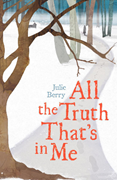 I loved the way the story is told in this book.
I loved the way the story is told in this book.


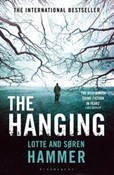

 s
s
 What a strange story. A story of the romance between a high school teacher and a former pupil. A story of the relationship between two drinking partners and their love of food. A story of how a friendship between two lonely single people blossoms into a very touching romance. And a story of our mortality. Forget about the vaporous flights of fancy of Bridget Jones. Tsukiko is a Japanese woman fast approaching 40. The Japanese career has consumed Tsukiko's life. Throughout the book, we do not meet any of her friends, the girlfriends that support single women. The closest thing to a friend that we are introduced to is the occasional boyfriend Kojima, a former classmate. Kojima loses out in the end to the old school teacher, Sensei.
What a strange story. A story of the romance between a high school teacher and a former pupil. A story of the relationship between two drinking partners and their love of food. A story of how a friendship between two lonely single people blossoms into a very touching romance. And a story of our mortality. Forget about the vaporous flights of fancy of Bridget Jones. Tsukiko is a Japanese woman fast approaching 40. The Japanese career has consumed Tsukiko's life. Throughout the book, we do not meet any of her friends, the girlfriends that support single women. The closest thing to a friend that we are introduced to is the occasional boyfriend Kojima, a former classmate. Kojima loses out in the end to the old school teacher, Sensei.



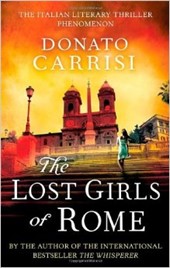 Initially I bought this as an audio book because Audible ad a two for one offer. But I eventually succumbed to buying a Kindle version as well. As an audio book it was difficult to listen too, especially when driving. It starts off as two separate stories, completely unconnected, and then a third story is added later in the book. So now we have the story of Marcus, a man with no memory investigating the disappearance of Lara an architecture student, the story of Sandra, who is trying to find out why her husband died 6 months previously and the story of the hunter, a man with no name on the trail of "The Transformist", a mysterious serial killer. Some reviewers have likened the work to that of Dan Browne, but this does it a great injustice. OK, so there is a secret society, the Penitenzeri. Very Dan Browne. A society dedicated to documenting evil, and whose members are Roman Catholic priests. But this is a dying society, phased out by the modern Church. All that remains are a few individuals. Not very Dan Browne, for Mr Browne wants the Church to remain as a mythical superpower of evil.
Initially I bought this as an audio book because Audible ad a two for one offer. But I eventually succumbed to buying a Kindle version as well. As an audio book it was difficult to listen too, especially when driving. It starts off as two separate stories, completely unconnected, and then a third story is added later in the book. So now we have the story of Marcus, a man with no memory investigating the disappearance of Lara an architecture student, the story of Sandra, who is trying to find out why her husband died 6 months previously and the story of the hunter, a man with no name on the trail of "The Transformist", a mysterious serial killer. Some reviewers have likened the work to that of Dan Browne, but this does it a great injustice. OK, so there is a secret society, the Penitenzeri. Very Dan Browne. A society dedicated to documenting evil, and whose members are Roman Catholic priests. But this is a dying society, phased out by the modern Church. All that remains are a few individuals. Not very Dan Browne, for Mr Browne wants the Church to remain as a mythical superpower of evil.


 BBC1: Mon-Fri at 14:15 Series 3
BBC1: Mon-Fri at 14:15 Series 3


 This film is an absolute joy to watch. We saw it when it was first screened and I chose it as my Christmas DVD for watching over the Christmas period. What I enjoyed was its sheer theatricality. So often films concentrate on the long lingering shots so you can read the minds of the characters, or else, there is gut-wrenching reality. But here there was theatre. There was pathos, humanity in all its forms, from the noble to the greedy. Heroes and psychopaths. And a window onto a world that was about to disappear forever, the grand central Europe, where the fabulous Austro-Hungarian empire was about to be annihilated by Hitler, the final boot being put in by Stalin.
This film is an absolute joy to watch. We saw it when it was first screened and I chose it as my Christmas DVD for watching over the Christmas period. What I enjoyed was its sheer theatricality. So often films concentrate on the long lingering shots so you can read the minds of the characters, or else, there is gut-wrenching reality. But here there was theatre. There was pathos, humanity in all its forms, from the noble to the greedy. Heroes and psychopaths. And a window onto a world that was about to disappear forever, the grand central Europe, where the fabulous Austro-Hungarian empire was about to be annihilated by Hitler, the final boot being put in by Stalin.